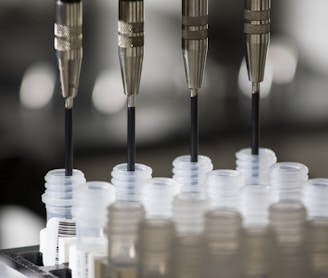Navigating the Landscape of Medical Laboratories: From Tests to Compliance
In the intricate web of healthcare, where accuracy and integrity are paramount, the role of medical laboratories is pivotal. The vast array of medical tests, from routine blood work to complex toxicology screenings, can provide crucial insights into patient health and inform medical decisions. However, the landscape of medical laboratories is far from simple, encompassing everything from different test types to compliance regulations. This blog post delves into this complex world, covering topics like test methodologies, compliance regulations, laboratory management, and the ever-evolving healthcare industry.
Jack Matthews
8/31/20233 min read


Title: Navigating the Landscape of Medical Laboratories: From Tests to Compliance
Introduction
In the intricate web of healthcare, where accuracy and integrity are paramount, the role of medical laboratories is pivotal. The vast array of medical tests, from routine blood work to complex toxicology screenings, can provide crucial insights into patient health and inform medical decisions. However, the landscape of medical laboratories is far from simple, encompassing everything from different test types to compliance regulations. This blog post delves into this complex world, covering topics like test methodologies, compliance regulations, laboratory management, and the ever-evolving healthcare industry.
Understanding Test Methodologies: Presumptive vs. Confirmatory Tests
Medical testing is often divided into two categories: presumptive and confirmatory tests. Presumptive tests provide initial results that suggest the presence or absence of a substance, condition, or disease. These tests are often quicker and more cost-effective, serving as a preliminary step. However, they are prone to false positives and negatives. Confirmatory tests, on the other hand, validate and confirm the results of presumptive tests. They are highly accurate but might take longer and cost more. Balancing the use of these test types is essential for accurate diagnoses and informed medical decisions.
Preventing Healthcare Fraud and Abuse: The Role of Private Pathology Labs
Private medical labs play a crucial role in preventing healthcare fraud and abuse. They ensure that tests are performed accurately, avoiding unnecessary or fraudulent tests that can drive up healthcare costs. Private pathology labs operate independently, allowing for impartial testing and reporting. Patients seeking "private pathology labs near me" often prioritize accuracy and unbiased results.
Navigating the World of Procedure Codes
Procedure codes, like 0241u, 88305, and u0005, are essential for accurate billing and documentation in medical laboratories. They help ensure that the services provided are appropriately reimbursed and tracked. Understanding procedure-to-procedure edits (PTP edits) helps prevent coding errors that can lead to claim denials.
Proficiency Testing and Compliance: Ensuring Quality
Proficiency testing (PT) is a critical aspect of lab compliance under the Clinical Laboratory Improvement Amendments (CLIA). Labs must participate in PT programs to assess the accuracy of their test results. Proficiency testing services play a key role in maintaining quality, identifying areas of improvement, and ensuring that laboratories meet stringent regulatory standards.
The Pros and Cons of Operating a Laboratory
Running a lab involves challenges and advantages. The pros include contributing to patient care, conducting cutting-edge research, and potentially generating revenue. On the flip side, cons include high operational costs, regulatory compliance burdens, and the need for skilled staff.
Navigating Stark Law and Compliance Regulations
Stark Law prohibits physician self-referral for certain designated health services, including lab tests. Compliance with Stark Law and other regulations is essential to avoid legal penalties. Regulatory compliance consultants specialize in navigating these complex laws to ensure labs operate ethically and within legal boundaries.
Building and Managing a Laboratory: Requirements and Strategies
Starting a lab involves a range of considerations, from acquiring necessary licenses to securing funding and equipment. Regulatory requirements for supervisors and staff must be met. Laboratory management solutions and strategies, like integrating laboratory information systems (LIS), help streamline operations and ensure efficient workflows.
Navigating ICD-10 and Diagnosis Codes
ICD-10 codes, such as R05.8, R05.9, R07.0, and R09.81, are critical for accurately documenting diagnoses. They ensure consistent communication between healthcare providers, labs, and insurers, facilitating accurate billing and patient care.
The Role of Consultants in the Laboratory Setting
Consultants play a significant role in improving laboratory operations. They can offer insights into streamlining processes, optimizing workflows, and ensuring regulatory compliance. Questions to ask consultants include inquiries about their experience, strategies, and success stories.
The Evolving Landscape of Laboratory Technology
Advancements in laboratory technology are transforming diagnostics and research. Automation, data analytics, and molecular diagnostics are reshaping the way labs operate. Staying up-to-date with these technological trends is essential for remaining competitive in the industry.
Conclusion
Medical laboratories are a cornerstone of modern healthcare, providing crucial diagnostic insights and supporting medical decisions. Navigating the landscape of these labs involves understanding diverse test methodologies, compliance regulations, and management strategies. As the healthcare industry continues to evolve, staying informed about the latest trends and regulatory changes is essential for ensuring the accuracy, integrity, and efficiency of laboratory operations.
Sound Medical Lab Consultants
sales@soundlabconsult.com
602-874-1311
National Clinical Lab Consultants for CLIA COLA CAP TJC
24/7/365 Support
Laboratory Billing Experts
Mobile Laboratory Billing
Lab Lead Gen and Sales
Lab Phone Support and Data Entry
Lab Back End Support
Lab Critical Call Services
